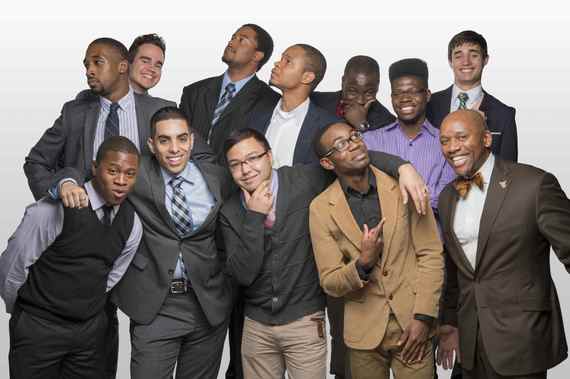Naquan King was a successful college senior - a well liked, respected campus leader who already had a job lined up for after graduation. Yet he still felt something was missing from his university experience, something he needed to truly be prepared for his future.
Despite having goals, he lacked a vision for his future.
"As people of color, especially men of color, we put ourselves in this box," said King, a 2014 RIT graduate who now works as a technology analyst for an investment bank in Jersey City, N.J. "We think 'We can't do this or do that. Or we can't speak to certain people in authority.' But we're people as well. We have to get that out of our heads that we don't belong here."
That feeling of not belonging, of not having the same access and opportunities as others, is at the root of the heated diversity discussions that are common on campuses across our nation today. Too many students from historically underrepresented populations feel that even with the intellectual capabilities, motivation and work ethic needed for college, success is not guaranteed. Supportive pillars are not always put into place to provide encouraging pathways to success and build these students' sense of self-efficacy.
"Going to college is tough," said Bertram Byam, who graduated in 2014 with a bachelor's degree management and information systems and is now an applications consultant for AT&T. "And when you add all the other socioeconomic stigmas to the equation, it can become a hell."
While many colleges and universities have instituted programs to encourage people of color to enroll in higher education, and in some cases, even help pay tuition, not enough is being done to help these students succeed - in college and beyond.
Studies show that young men of color struggle to stay enrolled and complete their degrees. The U.S. Department of Education reports that the national college graduation rate for African American men is just over 33.1 percent; for Latino men it is 41 percent and for Native Americans and Alaska natives the rate is 33.8 percent, compared to the graduation rate for white males at 54.5 percent.
The issues are more than financial, although those can be significant. Their success is undermined because their high school failed to prepare them academically (with higher science and math) or instill the critical thinking skills needed in a rigorous higher education environment.
So what's the issue here? Many colleges and universities, mine included, long ago launched programs that help underrepresented groups gain admission to college. And many of us have found ways to help these students pay for their education, through scholarships, federal programs and other means.
But more needs must be done to support these students - everything from tutoring to mentoring - not just so they graduate, but so they excel. There are some exemplary programs out there, such as the University of Maryland's Soaring Achievers program
and Project Male at University of Texas.
At my university, we have a variety of programs, and one of the more recent is called MOCHA - Men of Color, Honor and Ambition.
Now in its third year, 51 men, including King and Byam, have gone through this yearlong mentorship program. It's a personal, professional, academic and leadership development initiative aimed at giving participants a sense of community, of belonging and self-efficacy among participants. It's open to students in their sophomore to senior years, who pledge to maintain a grade point average of 3.0 or higher during their participating year. Each young man has two mentors, and goes through a series of workshops, such as those on wellness and health and a Dale Carnegie class, and completes a community service requirement.
At the end, each young man is gifted a custom-made suit, along with a custom shirt, tie and shoes, to bolster his newfound confidence and send him off into the world looking every bit the educated professional that he is.
Both King and Byam say the program made a huge difference for them, and their co-participants are still among their closest friends.
"The brothers, we hold each other accountable, whether it's over grades or following up on a job offer," King said. "These people push me to do more. I had goals, but MOCHA gave me a vision that guides me in everything I do. MOCHA breaks down the barriers that many people of color experience on campus."
The success of this program recently prompted a group of woman staff members to launch a similar program for women, which they are calling WOCHA.
We as university leaders need to keep pushing until all those barriers come crashing down.

